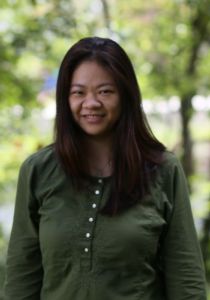
Davitte Khauv's internship in a Mayo Clinic research lab went so well that she was hired full time in 2007 when she completed her associate degree in biotechnology at Florida State College at Jacksonville (FSCJ).
Khauv, whose family immigrated to the United States from Cambodia when she was 18 months old, was influenced by her cousins' success in computer science and initially started work on a bachelor’s degree in this field before deciding she was more interested in laboratory work. She's happy she learned about FSCJ's biotech program during an internet search.
The college based its program to prepare technicians for careers in research labs on ATE initiatives in North Carolina, Texas, and California.
Khauv's advice to people considering biotech careers is: "Go for it! What you learn will be with you always and what you think you won’t need to learn will surprise you."
In the laboratory of Derek C. Radisky, PhD, Khauv assists with research on the microenvironment around cancer tumors. Radisky wrote in an email that he likes having Davitte on his team: “I’m glad that she has joined the lab.”
Radisky's research at the Mayo Clinic focuses on identifying the "micro-environmental signals that are most involved in the earliest stages of cancer development and to define methods to target these processes with the ultimate goal of prevention of cancer development."
Khauv is listed as a co-author with Radisky in scientific journal articles, including ones published in Journal of Cellular Biochemistry and The Journal of Biological Chemistry.
Graduate Explains Skills That She Uses at Mayo Clinic
"At FSCJ, I learned the basic laboratory techniques such as using a manual and automatic pipette ergonomically, measuring, titration," Khauv said during a question-and-answer interview for the college's "Alumni Spotlight" feature.
"Consequently, already having these skills allowed me to learn more during my internship. Rather than spending time learning how to correctly handle and use common equipment, I also learned how to pay attention to detail, how to appropriately use personal protective equipment (PPE) in specific areas, and how to handle certain chemicals and reagents," she said.
In an interview for ATE@20, Khauv said that her computer science background has been helpful when she needs to learn how to operate new equipment and software, and troubleshoot problems.
Her day-to-day tasks in the lab vary depending on the project she is assigned to work on. They include: cell culture, protein expression, cell processing, quantitative analysis, experimental analysis, data processing, and figure generation.
For the research that has been published in peer-reviewed academic journals, Khauv said, “My role in those publications was either in participation in conception and design of the experiments, helping with the methodology, or data analysis.”
Eventually, Khauv plans to earn a bachelor’s degree in health science.
"I am actually quite happy where I am at the moment and [I] am continually learning. This area of science doesn’t stop … it continues to pique my interest and allows me to move or grow into other fields such as the medical area," she said.
College Offers Two-Track Biotech Program
FSCJ enrolled its first cohort of students in the laboratory technician program in 2005. The program was based on curriculum developed by community college biotech programs affiliated with Bio-Link, the Next Generation National ATE Center for Biotechnology and Life Sciences.
FSCJ added a unique, food safety testing track with the support of an $800,312 ATE grant it received in 2009. The project combined student biotechnology education facilities with a commercial fee-for-service testing center. Eurofins Microbiology Inc., an international food and feed testing laboratory group, was the commercial partner in the "collaboratory" on the Jacksonville campus until December 2013. The college is currently considering how to use the space that allowed students to see professional technicians as they worked.
Allison Jennings, the project coordinator of FSCJ’s Biotechnology Program, explained that the windowed observation area in the shared space “proved to be very engaging and enlightening to current biotech students, prospective students, college personnel, and industry partners.”
She noted that Eurofins employees “were extremely accessible for student and lab assistant questions” and that they participated in the biotech program’s outreach efforts, workshops, and advisory board.
The college continues to work with industry partners to offer courses at actual workplaces. An instrumentation course, for instance, is currently co-taught by FSCJ faculty and Thermo Fisher Scientific employees.
Before they go to the company the students have extensive instruction using a liquid chromatography-mass spectrometer, which Thermo Fisher Scientific donated to the college. At the company the students receive additional instruction on analyzing pesticide residues in produce. The later part of the project involves student doing their own research on pesticide residues and presenting results to the class.

 Subscribe
Subscribe


 See More ATE Impacts
See More ATE Impacts

Comments
There are no comments yet for this entry. Please Log In to post one.